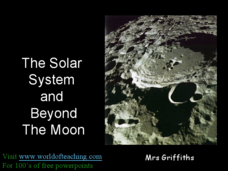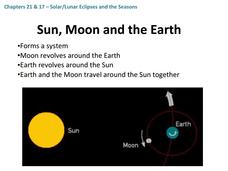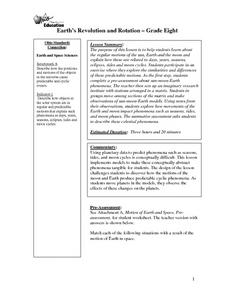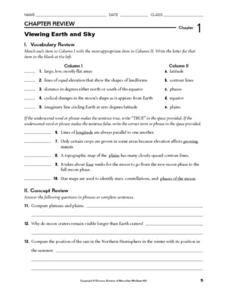Space Awareness
Sun, Earth and Moon Model
The moon orbits Earth while the Earth is rotating, and the Earth revolves around the sun. This can be a tricky concept for young astronomers. Implement an activity that helps distinguish between the movements of Earth's systems around...
Curated OER
The Solar System and Beyond: The Moon
Here is a very basic look at the moon and its positioning around our planet. The pictures and labels here show different phases and will help your space explorers understand our changing views of the moon along with the Earth's tilt and...
Curated OER
Solar/Lunar Eclipses and the Seasons
How do the moon, sun, and Earth line up to create eclipses? Why do the seasons change throughout a year? The answers to these questions are explained through this series of slides. This apt presentation outlines information using bullet...
Scholastic
Lesson Three: The Earth, Movement in Space
If you feel like you're standing still, you're wrong! The Earth is constantly rotating and orbiting under our feet. Demonstrate the Earth's movement within the solar system with a collaborative activity. With a candle or lamp in the...
Curated OER
The Reasons for the Season
Students explain the reason for the changes in season. In this lesson examining the relationship between the Earth and the Sun, students use an applet to discover how the alignment of the Earth and the Sun cause the change in seasons.
Curated OER
The Earth in Space
Students use computer images to explain why the Earth has seasons and examine the phases of the moon. They create 3-D images and present them to the class. They answer a series of questions at the end of the lesson.
Curated OER
Working on the Moon
Students take a mission to the moon. In this space science lesson, students visit selected websites to discover information about Earth's moon and the solar system. Students may take virtual missions to the moon and share...
Curated OER
Exploring the Night Sky: Fall/Winter
Students explain how moon phases occur. They explain three ways that the night sky has been used through history. Students locate some of the constellations in the night sky. They discuss stories and myths surrounding stars.
Curated OER
Astronomy
Students complete a unit of lessons on our solar system, its stars, and astronomers. They record information in a space journal, design constellations, define key vocabulary, observe the phases of the moon, and create a group planet...
Curated OER
Our Sky Clock
Students explore space science by completing a worksheet in class. In this astronomy lesson plan, students discuss and identify star patterns in the night sky and relate these patterns to the approximate time they appear. Students...
Curated OER
Astronomy
Students explore space science by utilizing education software. In this moon cycles lesson, students discuss the importance of the moon and the different phases we observe from earth. Students demonstrate the earth's orbit by creating a...
Curated OER
Charting Seasonal Changes
Students research the Earth's patterns of rotation and revolution, create a chart and graph of these patterns and use them to explain the causes of night and day and summer and winter.
Curated OER
Earth's Revolution and Rotation
Eighth graders investigate the regular motions of the sun, Earth and the moon and explain how these are related to days, years, seasons, eclipses, tides and moon cycles. They participate in an exercise where they explore the...
Curated OER
Viewing Earth and Sky
In this earth and sky learning exercise, students review terms associated with map reading. Students also review topographic maps and how contour lines represent elevation. This learning exercise has 5 matching, 5 true or false, 5 fill...
Space.com
Moon Facts: Fun Information About the Earth's Moon
How did the moon form? Learn the answer to this and numerous other fun facts in this article from Space.com.
ClassFlow
Class Flow: Space
[Free Registration/Login Required] This flipchart describes what causes the seasons, explains the moon's phases, and introduces what a constellation is. It utilizes the Activotes to help describe the phenomena.

















